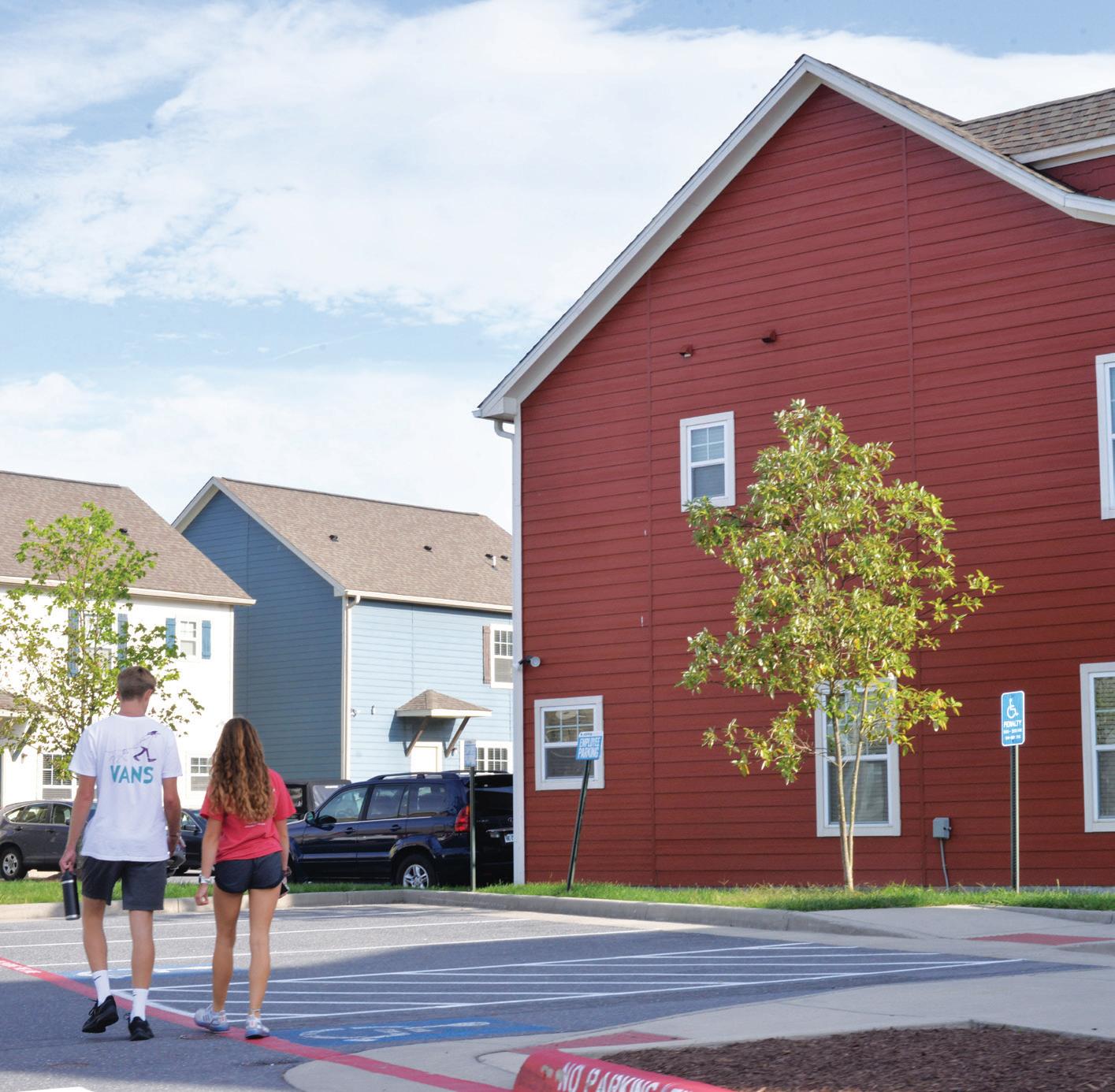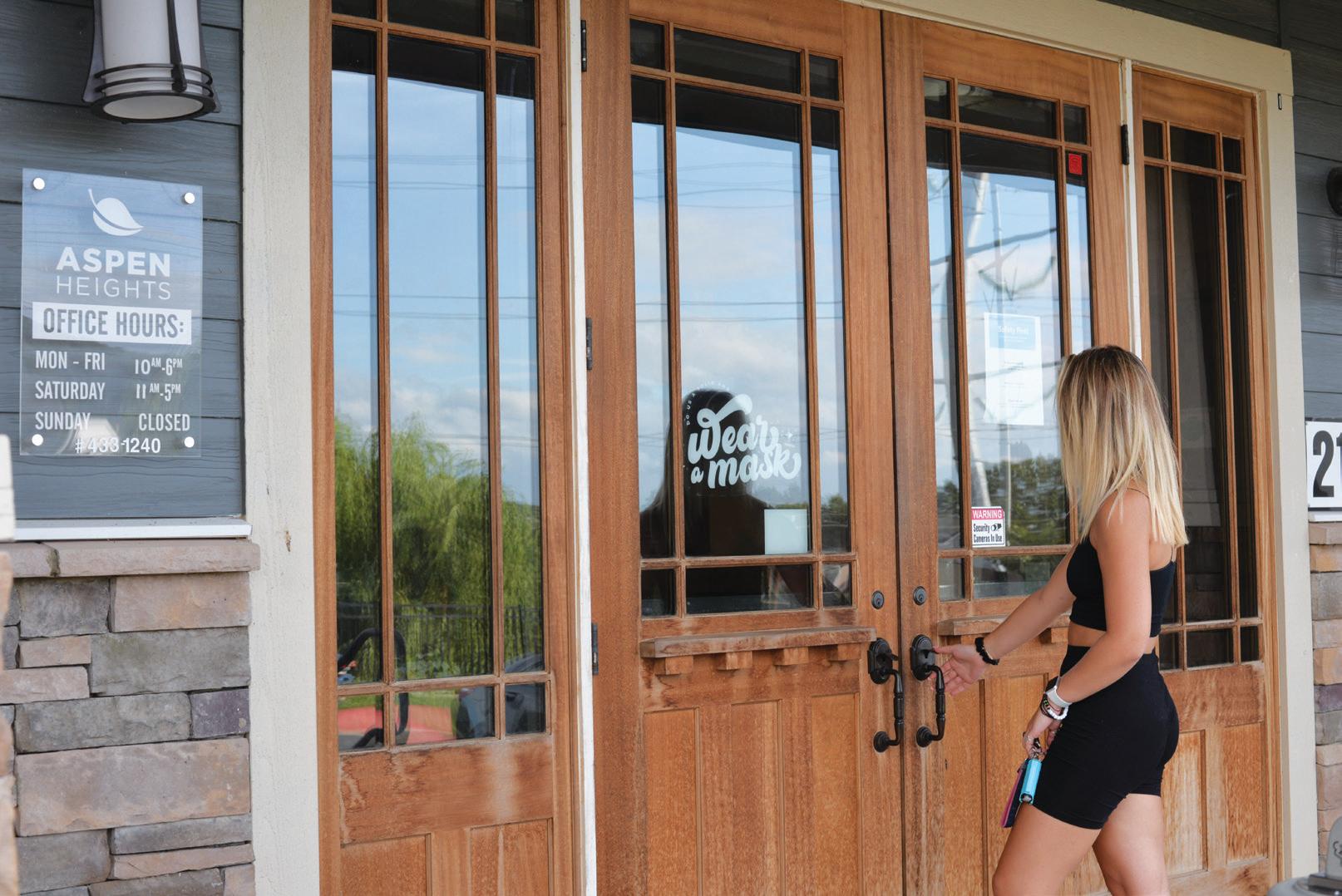
4 minute read
Students share what it’s like to live off campus during a pandemic
Off-campus housing communities have enforced mask-wearing at bus stops and capacity restrictions at other amenities like clubhouses to keep residents safe. Photo illustration by Hannah Wolff / The Breeze
Safe and healthy off campus?
Advertisement
Students explain how off-campus living has been impacted by COVID-19
By CHRISTINA BUTCHKO
contributing writer
An important aspect of student life impacting nearly 15,000 undergraduates lies in the hands of off-campus living and how they’re adapting to COVID-19.
For off-campus housing, students have the option to remain in their leased property, limiting contact with other students besides their roommates. With online classes being the temporary norm, off-campus amenities allow students access to classes when in-person instruction has come to a standstill. Adjusting off campus during COVID-19 for some students is a challenge. The need to travel to campus is reduced, unless students need food, to go to the health center or other resources. The Retreat, Aspen Heights and Fox Hill companies have declined interviews to comment on their COVID19 precautions. Natalie Migliore, a nursing major and resident at The Retreat said that as a sophomor living at The Retreat last year, she didn’t want to move out.
“I would rather not be living on campus during the pandemic,” Migliore said. “I’m not forced to be around people like the way we were in the dorms.”
Although the living situations in these offcampus locations are different from living in dorms on campus, ensuring student safety must be considered in these off-campus residence areas and apartment buildings, and adjustments because of the coronavirus have impacted how students live off campus. Migliore said the gym and most amenities in the clubhouse are now reservation-based and have limited hours.
Taylor Zampiello, a junior nursing major and resident at Aspen Heights, upsetly said, “Any time you enter the clubhouse, you have to wear a mask. But I feel like since I’m living off campus, I can really keep my space clean.”
When picking a place to live, how off-campus locations handle the coronavirus can be a deciding factor, along with the ability of the resident to control the cleanliness of their own space.
“The ability to Lysol and wipe down everything and stay in my own room and have my own bathroom made containing myself easier,” Zampiello said.
However, the possibility of living off campus and a roommate in the house contracting COVID-19 is concerning. Living with a positivetesting roommate may leave some students in a predicament of what to do next: quarantining, getting tested or going home.
When one of Zampiello’s roommates tested positive, she and her three other roommates socially distanced for the period of their roommate’s quarantine, and luckily, no one else got it.
Unlike a dorm, most roommates don’t need to share basic amenities like bathrooms. For The Retreat and Aspen Heights, each resident may have their own bathroom, and depending on whether they leased their unit furnished, a desk and chair may be provided. Residents essentially could quarantine themselves in their rooms for as long as they needed.

Migliore said that although off-campus living eases the strain of contracting the virus, she said she still believes it’d be helpful to keep track of how many of those with COVID-19 cases are self-quarantining within The Retreat. “It is inconvenient that certain amenities aren’t as easy to access, but I wouldn’t want to put other people at risk,” Migliore said. Foxhill Townhomes and Pheasant Run offer a slightly different off-campus living situation in which residents in each townhome don’t have their own off-suite bathroom; four said that although he doesn’t have his own bathroom, sharing has caused no issues. Similarly to The Retreat and Aspen Heights, Foxhills amenities include a clubhouse with a fitness center and copier and fax machines for residents to access. The same precautions for social distancing standards and wearing a mask are required in the office and clubhouse as well as for maintenance workers and property managers who enter the townhomes. “My property manager has been cautious about social distancing when he visits the classes, some students in Foxhill have found their own way to adjust to online classes with the pandemic. “I’ve seen a lot of people outside doing class work since the switch to online,” Cameron said. Even with adjustments, residents of some of these off-campus housing locations voice concerns on what they believe was overdone in terms of restrictions to amenities. “Closing the pool at Aspen was unnecessary,” Zampiello said. “They had a 35 people max really touching anything.” COVID-19 has created a time of uncertainty for JMU students living off campus. Regardless of the numerous changes that had to be made because of COVID-19, off-campus life is still a viable option for some students looking to live elsewhere than on campus. “I think that [off-campus housing is] doing the best that they can do, being that they cannot force residents to social distance outside of their facility,” Migliore said. “ Natalie Migliore The Retreat resident “I would rather not be living on campus during the pandemic. I’m not forced to be around people like the way we were in the dorms.” Living off campus allows for more privacy and may help with isolating. Photo illustration by Hannah Wolff / The Breeze residents share two bathrooms. Jack Cameron, house,” Cameron said. “I think Foxhill has [rule], which was never met any time I went. a sophomore computer information systems made good decisions.” People only were around who they came with CONTACT Christina Butchko at butchkcl@ major and resident at Foxhill Townhomes, Even with the pandemic halting in-person and would use towels on chairs and weren’t dukes.jmu.edu.






